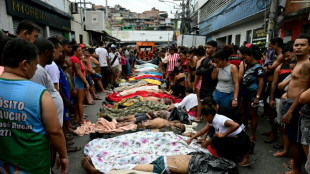Downgraded Hurricane Melissa makes landfall in Cuba, NHC says
A downgraded Hurricane Melissa made landfall in Cuba early on Wednesday after ripping a path of destruction across Jamaica, which authorities have designated a "disaster area."
The National Hurricane Center (NHC) said Melissa, which it described as an "extremely dangerous hurricane", had weakened to a Category 3 storm before it made landfall in Santiago de Cuba province on the island's southern coast.
It hit with maximum sustained winds of approximately 120 miles (195 kilometers) per hour, the NHC said, after fluctuating between Category 3 and Category 5, the highest on the Saffir-Simpson scale.
Cuban residents fled the coast as it approached, with local authorities declaring a "state of alert" in six eastern provinces.
Residents told AFP they had been stockpiling food, candles, and batteries since Monday.
"We bought bread, spaghetti, and ground beef. This cyclone is serious, but we'll get through it," Graciela Lamaison told AFP in Santiago de Cuba.
Authorities in Haiti, east of Cuba, ordered the closure of schools, businesses and government offices on Wednesday.
Cuban authorities reported that some 735,000 people have been evacuated so far.
"It will be a very difficult night for all of Cuba, but we will recover," Cuban President Miguel Diaz-Canel said on social media platform X.
Floraina Duany, 80, prayed on Tuesday to Our Lady of Charity of El Cobre, patron saint of Cuba, asking that Melissa not cause damage.
"If you are the mistress of the waters, break up (Hurricane Melissa) so it doesn't do us so much harm," she told AFP near her home in Playa Siboney, a town 25 miles (15 kilometers) from Santiago de Cuba.
- 'Disaster area' -
Melissa hit Jamaica as a Category 5 hurricane around midday Tuesday with sustained winds of up to 185 mph (295 km/h), the worst hurricane to hit the island since meteorological records began.
It took hours to cross Jamaica before first weakening and then intensifying again.
Jamaican Prime Minister Andrew Holness declared the island a "disaster area" and authorities warned residents to remain sheltered because of continued flooding and the risk of landslides.
Lisa Sangster, a 30-year-old communications specialist in Kingston, said her home was devastated by the storm.
"My sister... explained that parts of our roof was blown off and other parts caved in and the entire house was flooded," she told AFP.
The scale of Melissa's damage in Jamaica was not yet clear. A comprehensive assessment could take days because much of the island was still without power, with communications networks badly disrupted.
Government minister Desmond McKenzie said several hospitals had been damaged, including in Saint Elizabeth, a coastal district he said was "underwater."
"The damage to Saint Elizabeth is extensive, based on what we have seen," he said in a briefing.
"Saint Elizabeth is the breadbasket of the country, and that has taken a beating. The entire Jamaica has felt the brunt of Melissa."
The hurricane was the worst to strike Jamaica, hitting land with maximum wind speeds more powerful than many of recent history's strongest storms, including 2005's Katrina that ravaged the US city of New Orleans.
- 'Severely damaged' -
Jamaica's climate change minister told CNN that Melissa's effect was "catastrophic," citing flooded homes and "severely damaged public infrastructure" and hospitals.
Mathue Tapper, 31, told AFP from Kingston that those in the capital were "lucky" but feared for fellow Jamaicans in the island's more rural western areas.
Broad scientific consensus says human-driven climate change is responsible for intensified storms such as Melissa, which are increasingly frequent in the region and bring higher potential for destruction and deadly flooding.
"Human-caused climate change is making all of the worst aspects of Hurricane Melissa even worse," said climate scientist Daniel Gilford.
The Jamaican Red Cross, which was distributing drinking water and hygiene kits ahead of infrastructure disruptions, said Melissa's "slow nature" exacerbated the anxiety.
The United Nations is planning an airlift of some 2,000 relief kits to Jamaica from a supply station in Barbados once air travel is possible.
Assistance is also planned for other affected countries, including Cuba and Haiti, UN spokesperson Stephane Dujarric told journalists.
Jamaican officials said around 25,000 tourists were in the country, famed for its normally crystalline waters.
C.Keone--HStB




